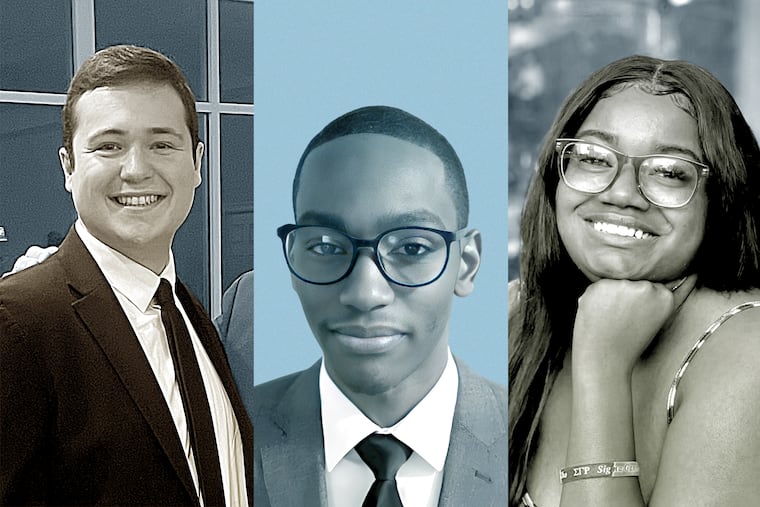Three tips for young people to thrive in politics
Speak only when you have something to say. Don't worry about age. Apply for opportunities you doubt yourself for.

It is hard being the youngest everywhere you go. In response to reading my op-eds and coverage of my policy work, people from across the region message me and ask questions. I value all of their feedback, but the feedback I enjoy most is from other young people. Often, they’re amazed that I come from the same neighborhoods they do. And they want to get to where I’ve gotten. I’m always mindful of how nice it would’ve been to have had other young people to look to when I first started at 14 years old.
In the spirit of spreading advice and support, I figured I should write about ways for young people to thrive in political spaces. In writing this op-ed, I called some friends who are young professionals to weigh in. Here are our tips:
My tip: Speak only when you have something to say
In my experience, most people talk just to fill the void. Don’t be one of those people. Talking to talk becomes annoying quickly, so only speak when you have something to say. This will have two effects: First, it will make people listen to you more. Everyone listens to the quiet person who seldom speaks. When you use your voice only when it will be meaningful, you earn a positive reputation.
» READ MORE: At 18, he’s a Philly City Council aide, a Gates Scholar, and the author of 62 pieces of legislation
The second effect of speaking only when you have something valuable to contribute is that others will be drawn to you for advice. This is important for those who want to advise lawmakers. Your advice is only as good as your trustworthiness. Trustworthiness goes down if you become known for saying things that don’t matter. Good policy advisers and aides know what to say, when to say it, and how to say it.
It’s not complicated: Speak only if you have something to say.
Now, it may seem that those who are louder get more of the spotlight — trust me, I know. I was behind the scenes, grinding away for years, before The Inquirer’s Stephanie Farr wrote about me last year. But your time will come. And, to be transparent, people knowing your name has downsides: Strangers start thinking they know you well enough to make character assessments, friends treat you differently, egos get threatened, and you sometimes have to deal with plain-old meanness.
Just keep your head down, focus on doing your job well, use your voice when it will be valuable, and God will do the rest.
Nayyar Tenner’s tip: Don’t worry about age
Nayyar Tenner, 24, is Councilmember Katherine Gilmore Richardson’s communications manager and scheduler, and a proud member of Sigma Gamma Rho. She started working for Richardson in late 2021. I asked Tenner what she’d tell a young person looking to get into politics. Her response: Don’t worry about your age.
She recounted instances where people tried to explain things to her like she was a child. “When you’re young and working in politics, a lot of people assume you don’t know anything. People think being a minority — a Black woman — in these spaces is the hardest part, and it’s really not, because City Council, for example, is very diverse when you think about a lot of other cities. But when it comes to age, not very much.” Because of the need for age diversity, Tenner encourages young people to get involved in politics.
“In the year of 2023, we do not need to see the same faces in the same spaces for 40 to 50 years. We don’t need to see it. Even if you feel like you’re too young or you’re not ready, then you start small. Everyone doesn’t have to take a big leap and work for City Council,” she added, but it’s important that young people participate in the process.
Anthony Glass’ tip: Apply for opportunities you doubt yourself for
Anthony Glass is the director of legislation and policy for Councilmember Curtis Jones Jr. He’s a 22-year-old senior at Temple University, studying political science. His advice is to take a leap of faith and apply for positions you may doubt yourself for.
“Don’t be afraid. Apply for that internship. Apply for that job. Maybe you don’t think you’re the right candidate, or you think you’re not as experienced as you should be, or you’re not who you would see as the prime candidate in this position,” he told me. “Don’t be afraid. Apply for it, because you may just be surprised.”
Glass went on to underscore the general enthusiasm people in power have for helping young people grow professionally.
“Elected officials and staffers, they love to help college kids. They love to help high school students because they see themselves — they say, ‘Hey, I was that scared sophomore applying for internships, so I understand that, I understand them, so I want to help them out.’”
Jemille Q. Duncan is the senior policy adviser of Councilmember Anthony Phillips, a columnist, and a Gates Scholar at Swarthmore College. He’s the former aide of two other Council members and a state senator. @jq_duncan